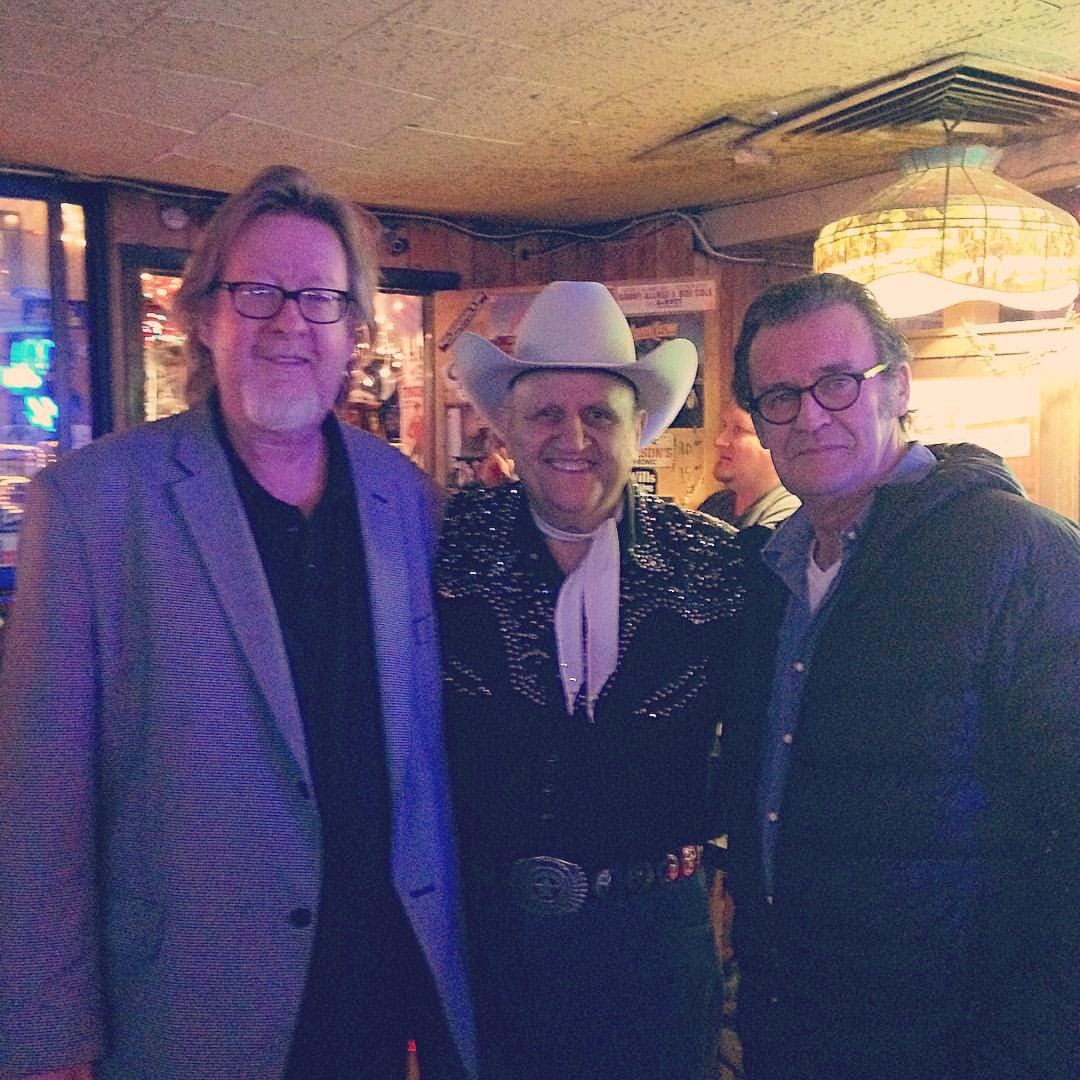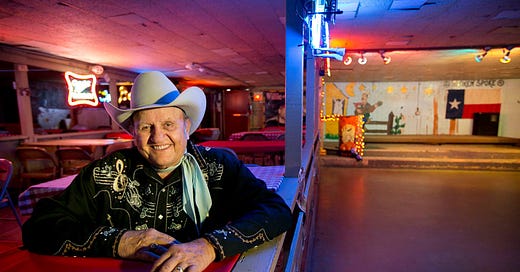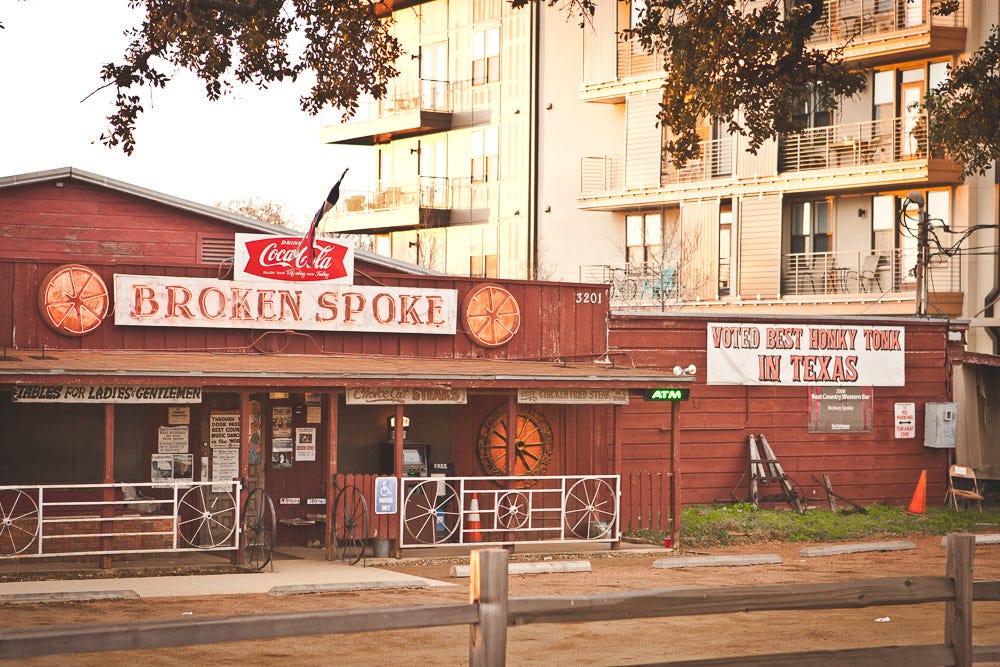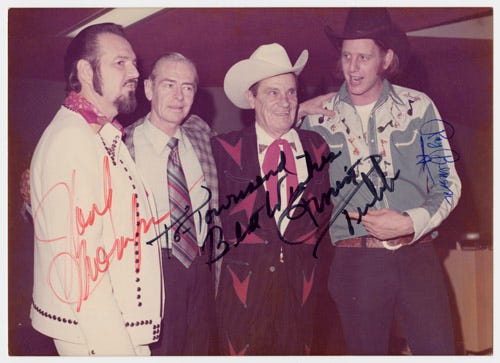Clubland Paradise #3: Broken Spoke
If it ain't broke... the last true honky tonk in Austin, once on the outskirts of town
Jerry Jeff Walker used to say that he didn’t live in Texas, he lived in Austin. The opposite can be said of the Broken Spoke, where true honky tonk Texas resides in the soulless heart of Boomtown.
The rustic red roadhouse used to be on the outskirts of town, but now it’s smack dab in the middle, like the Alamo. South Lamar is almost unrecognizable from just 10 years ago, but inside the Spoke it’s still the ‘60s, the band is playing “Walking the Floor Over You,” and the dancefloor is a counter-clockwise swirl of bodies.
It’s all about dancing at the club, which was founded in 1964 by James White’s stepfather Joe Baland, a gregarious carpenter in pinstriped overalls, who convinced Austin businessman Jay Johnson to not only lease him the old Al Erlich Lumber Co. property at 3201 S. Lamar Blvd., but provide $5,000 worth of building materials.
The first year it was just a beer joint that served the best chicken-fried steak in town. The dancehall, James White’s baby, was built on in the back in 1965.
"One of the things Joe used to say was, `I've been drinking beer on this road for 30 years and always paid retail, and if I could build my own place I could pay wholesale and save a lot of money,’" Johnson told John Kelso for Baland’s obit in 1990. At age 72, suffering from cancer and other ailments, Baland did what he told everyone he would, turning a shotgun on himself in the one-room shack he lived in behind the Spoke.
He’d officially turned over the club to the Whites in 1980, but they’d always been running the place, with James behind the bar and Annetta in the kitchen since day one. James also booked the 661-capacity venue, a job he held until his passing in January 2021.
The first name act to grace the stage was Bob Wills and the Texas Playboys, White’s all-time favorite group, in 1966. Their fee was $400. “Nobody believed they were gonna show, until Bob Wills himself walked through that door, smoking a big cigar,” White said. “The fellas practically fell off their barstools.”
The butt from that cigar is featured in the Spoke’s “Tourist Trap” mini-museum, along with momentos from other acts who’ve played there, including Willie Nelson, Ernest Tubb, Roy Acuff, Tex Ritter and Kitty Wells. There’s also a cowboy hat from George Strait, who played the Spoke once a month from 1975 to 1982, for about $500 a gig. Along with Big G’s in Round Rock and the Skyline on North Lamar, the Spoke was a stop on the honky tonk circuit of the ‘60s and ‘70s.
“We have only two rules when it comes to the bands,” Annetta told me in 2014. “First, they’ve gotta be country. And then I tell them, ‘If the dance floor ain’t full, you’re playing the wrong songs!’” Club regulars Al Dean and His All Stars, from San Antonio, could always fill the floor with their resurrection of a forgotten fiddle tune called “The Cotton-Eyed Joe” in the ‘60s. The accompanying circle dance and “Bullshit!” response were developed at the Spoke, among other Texas honky tonks, ten years before Urban Cowboy.
Acts like Jesse Dayton, who held a Thursday night residency for years, tailor their sets for the venue. “It’s not about presenting yourself as a singer-songwriter—or even an entertainer—at the Broken Spoke,” Dayton said. “The music is totally for the dancers, and we play the shuffles, waltzes, polkas, and 4/4 beats they love.”
Dale Watson is so tuned into what the Spoke crowd wants that he named a Texas two-step “Quick Quick Slow Slow” as a template for new dancers, who share the floor with expert twirlers. As for non-dancers, they quickly learn to respect the number one Spoke rule: no standing on the dance floor. That elbow was on purpose.

The most successful Spoke bands have been the ones like People’s Choice- who packed it every Wednesday from the late ‘70s through the ‘80s- that present perfect copies of the hits old and new. The Spoke is the most famous cover band bar in Texas.
One longtime Spoke act who did sing original compositions was Don Walser, which worked because his songs sounded like classic country. But in his 14th year at the club, Walser’s health had deteriorated to the point that his fans were openly concerned. “Don just loves to sing, but it broke my heart to watch him perform when he was ailin’ so badly,” White said of his decision in 2003 to scratch his good friend from the schedule. The people had stopped dancing.
“When you come to the Broken Spoke, you’re coming to the same place that folks have been coming to for 50 years,” James White said in 2014 about his aversion to change. The Spoke experience is still one of the coolest, most authentic things about Austin, a visitor’s favorite stop at night after a day at Barton Springs Pool.
“Texas has a dance culture unlike any state in America,” said Dayton. “Asking someone to dance without any intention of picking them up is just a part of who we are. And it started at places like the Broken Spoke.”
Spoke regulars have also protested change, like when the price of a beer was raised a nickel to 30 cents in the ’60s. Then, when selling liquor by the drink became legal in Texas in 1973, the Spoke opted to remain a beer joint because regulars threatened mutiny if they couldn’t continue to bring in their own bottles of hooch. Wholesale drinker Baland understood.
But around the same time, the venue picked up a new crowd of music fans. “Freda and the Firedogs played a benefit here for Lloyd Doggett and drew 500 people,” said White, referring to Marcia Ball’s popular country band of the early 1970s. “So I started booking them regularly.”
Asleep at the Wheel and Alvin Crow and the Pleasant Valley Boys were other long-haired country bands that White booked in the ’70s. “Their fans had a dance we called ‘the hippie hop,’” White said. “But that crowd helped us through some hard times.”
The Spoke finally got its liquor license in 1980, one of the only changes in the venue’s 58-year history. But, of course, the biggest difference these days is the absence of resplendent Western-attired greeter James White, whose “howdy” duty was essential to the club’s personality. But the Spoke rolls on like it has to.
“When people come to Texas, they wanna see Texas,” Annetta said. “But you can’t find it anymore in Austin. Maybe in West Texas or Fort Worth, but not in Austin. That old Texas, real Texas, is gone, except when you come to the Broken Spoke.”
Clubland Paradise #1: Saxon Pub







Photo by Artist:
Jay Janner
Copyright holder:
Austin American-Statesman